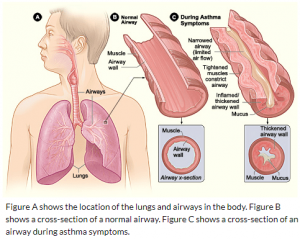ASTHMA – CAUSES, SYMPTOMS AND TREATMENT
Asthma is a chronic lung disease that inflames and narrows the airways. It causes recurring periods of wheezing (a whistling sound when you breathe), chest tightness, shortness of breath, and coughing which usually occurs at night or early in the morning.
Asthma affects people of all ages, but in most cases, it starts during childhood. As per the Global Asthma Report 2018, asthma affects as many as 339 million people and its prevalence is rising.
For some people, asthma is a minor and occasional health issue. For others, it can be a major health issue that interferes with their daily activities, leading to a life-threatening health problem. Even though asthma can’t be cured permanently, its symptoms can be controlled. Since asthma often changes over time, you need to work with our asthma specialist to track your signs and symptoms and adjust treatment as required.

Symptoms
Asthma symptoms vary from individual to individual. You may have infrequent asthma attacks, have symptoms only at specific times – such as when exercising, or have symptoms all the time.
Common asthma signs and symptoms may include:
- Shortness of breath
- Chest tightness or pain
- A whistling or wheezing sound when exhaling
- Trouble sleeping caused by shortness of breath, coughing or wheezing
- Coughing or wheezing attacks that are worsened by a respiratory virus, such as a cold or flu
Symptoms that indicate your asthma is probably getting worsened:
- Asthma symptoms that are more frequent and bothersome
- Increasing difficulty in breathing
- The need to use a quick-relief inhaler frequently
For some people, asthma signs and symptoms occur in certain situations, such as:
- Exercise-induced Asthma: It can be worse when the air is cold and dry.
- Occupational Asthma: This type of asthma is triggered by workplace irritants such as chemical fumes, gases or dust.
- Allergy-induced Asthma: It can be triggered by airborne substances, such as pollen, mold spores, cockroach waste or particles of skin and pet dander (tiny, even microscopic, flecks of skin shed by pets with fur or feathers.)
Causes
Many factors can trigger or worsen asthma symptoms. Most probably, a combination of environmental and genetic factors (inherited) can trigger asthma symptoms.
Common Asthma Triggers
Asthma triggers vary from person to person and may include:
- Airborne substances like pollen, dust mites, mold spores, pet dander or particles of cockroach waste
- Respiratory infections like flu or the common cold
- Physical activity (exercise-induced asthma)
- Cold air
- Air pollutants and irritants, such as smoke
- Certain medications like aspirin and naproxen
- Strong emotions and stress
- Sulfites and preservatives added to some types of foods and beverages, including shrimp, dried fruit and processed potatoes
- Gastroesophageal Reflux Disease (GERD) – a condition in which stomach acids back up into the throat
Risk Factors
Risk factors that may increase your chances of developing asthma include:
- Family history – having a blood relative, such as a parent or sibling, with asthma
- Having another allergic condition, such as hay fever
- Being overweight
- Being a smoker
- Exposure to secondhand smoke
- Exposure to exhaust fumes or other types of pollution
- Exposure to occupational triggers, such as chemicals used in farming, hairdressing and manufacturing
Complications
Common asthma complications comprise:
- Signs and symptoms that interfere with sleep, work or recreational activities
- Sick days – absence from work or school during asthma attacks
- Permanent narrowing of the bronchial tubes (airway remodelling) that affects the way you breathe
- Emergency clinic visits and hospitalizations due to severe asthma attacks
Proper and timely treatment can make a big difference in preventing both short-term and long-term complications caused by asthma.
Diagnosis and Treatment
The diagnosis of asthma is based on your medical and family histories, a physical exam, and test results. Our specialist doctors identify the severity of your asthma; intermittent, mild, moderate or severe; and the level of severity will determine what treatment plan you require.
The main goal of the asthma treatment is to control the disease, which will:
- Prevent troublesome symptoms like coughing and shortness of breath
- Reduce the requirement of quick-relief medicines
- Help maintain good lung function
- Let you maintain your normal activity levels and sleep comfortably through the night
- Prevent asthma attacks that could lead to a hospital stay
Living with Asthma
Most people with asthma can successfully manage their symptoms by following a proper asthma action plan and having regular check-ups. However, knowing when to seek emergency medical care is crucial in managing the disease.
Learn how to use your medicines properly and at the correct time. If you need to take inhaled medicines, you can practice using your inhaler at your Asthma Clinic. If you take long-term control medicines, take them daily as per the doctor’s prescription.
It is also crucial to keep recording your asthma symptoms in order to track how well your asthma is controlled. Also, having regular check-ups will help you assess your level of asthma control and will help you adjust your treatment for better asthma control.
Identifying and avoiding asthma triggers are important in managing asthma. Several outdoor allergens and irritants, ranging from pollen and mold to cold air and air pollution, can trigger asthma attacks. Identify what causes or worsens your asthma and take appropriate steps to avoid those triggers.






